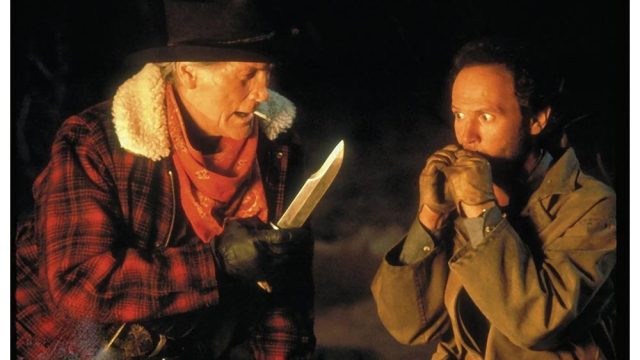Yeah, okay, everyone knows I’m not the world’s biggest fan of the Kubrick The Shining. That said, tell me Stephen King was wrong for preferring Jack Palance in the role of Jack Torrance. Sure, Palance made a career of playing the heavy; he had two Oscar nominations by that point, both for playing ominous figures. Okay, so he was too old, having been born in 1919 (or possibly 1920), but that’s the only issue. He had that intensity that makes it possible to stick the landing, but you could also believe that he was trying to do better and that he might be able to keep his demons under control. The way he acts after connecting with Billy Crystal, where you know he’s capable of breaking him like a twig but also chooses not to.
How exactly the man born Volodymyr Ivanovich Palahniuk was related to author Chuck Palahniuk, or if he even actually was, is something I can’t determine; I don’t have the professional version of the software that would let me work it out. Palahniuk was told they were related, and it’s certainly true that it’s not the most common name in the US. The one who became Palance was the son of a coal miner who died of black lung. He himself spent some time in the mines, but not a lot. He first became a boxer. What his boxing career looked like depends on if you ask Wikipedia or IMDb, but he decided that was a stupid way to earn $200. He tried several other jobs before becoming an actor.
There’s a pair of urban legends about him. We can now conclusively prove he didn’t read Marisa Tomei’s name as a joke, because we now know what would’ve happened. He himself, however, disputed the idea that his face looked the way it did because of injuries sustained when bailing out of a bomber in 1942. He was apparently a pilot-in-training in Arizona, but it seems he spent two years being treated for it. He insisted, however, that the face he had before that ill-fated flight and the face he had when the surgeries finally ended were essentially the same face.
Sure, he’s got one of those careers where he’s appeared in multiple movies with puppets in the corner. (Three on the actual show and three through RiffTrax, with only one unique to each presentation.) There are plenty more he did that frankly would deserve the treatment. It’s surprising to me that his career went the direction it did after Shane. No, he didn’t win the 1953 Best Supporting Actor Oscar, losing to Frank Sinatra in From Here to Eternity. But honestly the category that year was stacked as hell, and the only reason I’m not saying any of them would have been worthy winners is that I haven’t seen Stalag 17 yet.
Ten years after Shane, Jean-Luc Godard cast him in Contempt as the American. His Wikipedia page talks a lot about his “stardom,” but let’s be clear—a lot of those movies were low-budget and bad and don’t count as anyone’s stardom. Apparently, his hosting Ripley’s Believe It or Not in the ‘80s is what brought him back to the public eye. Yes, okay, Young Guns is not quite stardom, but it did lead to City Slickers and his Oscar. Should he have won? Arguably, that’s the year John Goodman should have won for Barton Fink, but he wasn’t nominated. It wasn’t a great slate that year, and at least City Slickers was funny on purpose, unlike JFK.
If even one of these details was new to you, consider supporting my Patreon or Ko-fi!

